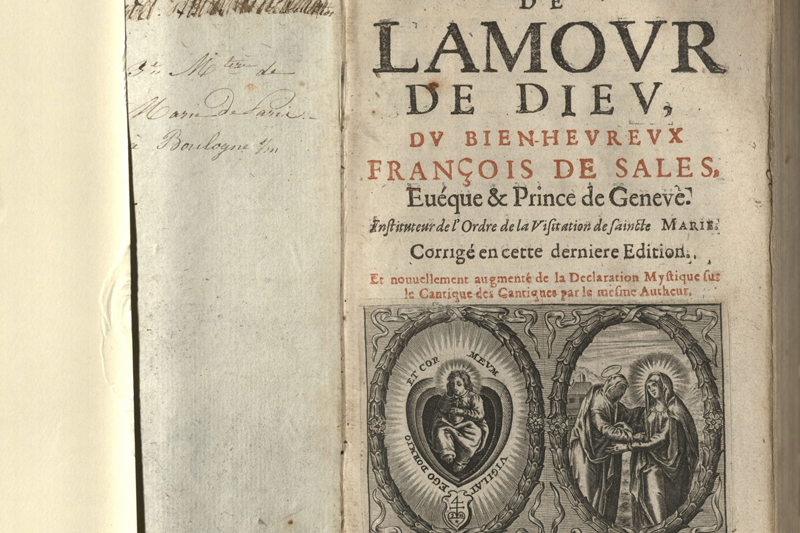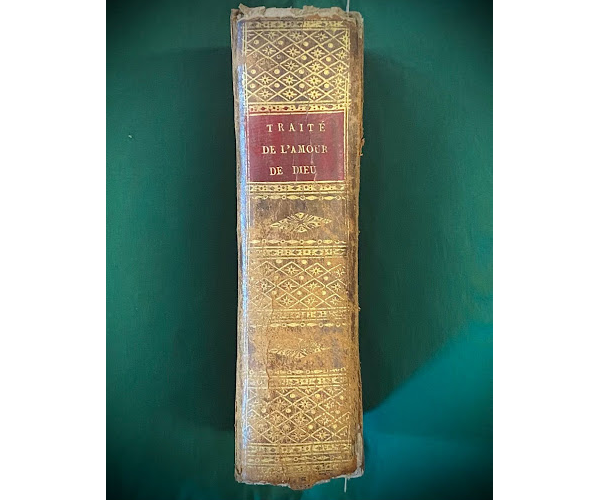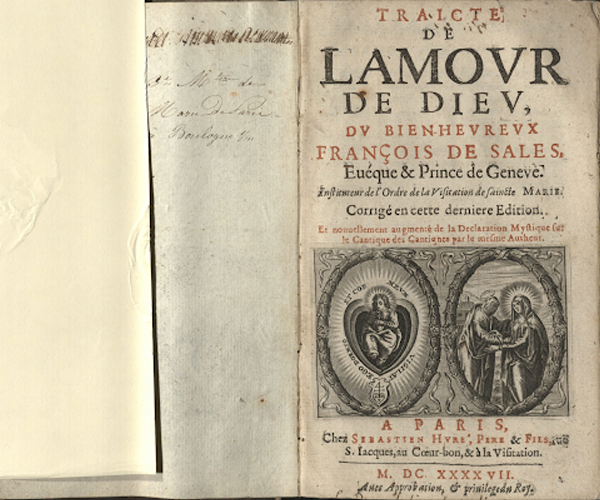Blogs

For the Love of God
By By Emma Donnelly
In 2012, the Marian Library acquired a 1647 copy of St. Francis de Sales’ 1616 book Treatise on the Love of God. The book has a tattered but perfectly intact leather cover and an ornately decorated spine with the title in French stamped in gold letters. It is no bigger than your hand, yet it carries the most powerful message of love.
What Is Love?
Love has different meanings for different people. For parents, love may be the first time they held their children in their arms. A child might tell you that they love candy or coloring. Disney would define love as two people meeting, conquering the evil villain plotting their demise, and living happily ever after. No matter how you define it, we live in a world of love. In the words of perennial rom-com actor Hugh Grant, “If you look for it, I’ve got a sneaky feeling you’ll find that love actually is all around.” Love is an omnipresent force, and the reason is that it comes from an omnipresent source: God.
How could a world filled with hate and destruction also be built on and illuminated by the love of God? In his Treatise, Francis, who dedicated his life to revealing God’s love to the world, provides some possible answers.
A Priestly Prince
Francis was born on Aug. 21, 1567, and grew up in his family’s castles in upper Savoy, France. He was the oldest of seven children. Francis graduated from the University of Padua in 1591 with a doctorate in canon and civil law. However, against the wishes of his father, a well-known senator of Savoy, Francis chose to follow the Lord and was ordained on Dec. 18, 1593.
Francis spent the first nine years of his priesthood in the Calvinist district of Chablais, France, with a dangerous mission: to reintroduce Catholicism into the region amidst the Protestant Reformation. Francis preached and distributed self-published pamphlets explaining Catholic doctrine. Eventually, he won the trust of the people, and they began to listen. When his time in Chablais came to an end, he had convinced over 40,000 people to return to Catholicism.
On Dec. 8, 1602, Francis was ordained the bishop of Geneva. Francis believed it was a priest’s duty to learn all he could so that he could better guide people to live lives of faith and foster better relationships with God. Committed to guiding those under his jurisdiction, he published many works, two of the most famous being Introduction to the Devout Life (1608) and the Treatise.
In these writings, Francis preached that God loved all creatures equally and individually and that each person is called to their own unique vocation. Francis wrote that a person formed a deeper connection with God by following their calling. He pointed to Mary as the prime example of how to spread God’s love.
‘Traité de l’Amour de Dieu’
Francis wrote Treatise on the Love of God (in French, Traité de l’Amour de Dieu and sometimes Traicté de l’Amour de Dieu) as a manual to help Christians strengthen their relationship with God. It was also written for the ordinary citizen and meant to be widely circulated. Francis addresses the reader as “Theotimus,” which in Latin translates to “to honor God.”
Francis draws on the example of the Blessed Virgin to best exemplify God’s love and how to honor it. The title page contains an image of Mary’s visit to her cousin, Elizabeth, which serves as the foundation of the religious order he instituted. Francis believed that in this loving encounter, known as the Visitation, Mary perfectly embodied the quality one needs in order to find their vocation. He writes, “As the precious stone, asbestos, does by a peerless propriety preserve for ever the fire which it has conceived, so the Virgin Mother’s heart remained perpetually inflamed with the holy love she received of her son.”
The Order of the Visitation
Two years after being ordained bishop, Francis began receiving visions in which God requested that Francis found a women’s faith community. In these visions, God revealed to Francis a woman who would help Francis complete this task. Miles away, in the small French commune of Monthelon, a wealthy widow by the name of Jane de Chantal was having similar experiences. Through her dreams, God had shown her a man who would give her inner peace and help her find her calling.
The two met in 1604 when Jane was visiting her father in her hometown of Dijon with her children and attended a Lenten service given by the bishop of Geneva, Francis. At some point during the Mass, their eyes met, and it was as if they’d been struck by divine lightning. In the coming years, Francis and Jane became personal and spiritual friends. In 1610, the two founded an order for women who wanted to dedicate their lives to works of charity. Originally, it consisted of only four women in a house Francis provided close to his home in Annecy, France. They grew in number and became known as the Order of the Visitation.
The order’s goal was to help women follow Mary’s example from her visit to Elizabeth — namely practicing humility, piety and charity. He entrusted Jane with running the order while he continued his work as bishop and presided over the order.
Francis died on Dec. 28, 1622, from a heart attack in Lyons, France, at the age of 55. He was canonized on April 19, 1665, and his feast day is Jan. 24.
St. Francis de Sales’ Lesson on the Love of Mary
The message Francis attempted to convey was controversial. He preached not only that people had individual callings from God, but that God loved each individual equally. Francis claimed that because of this, the best way to respect God was to find and follow your vocation and to love all other people unconditionally as God does.
Francis also had another card to play. In his writings and his sermons, he pointed to the Blessed Virgin as the example people must follow. When Mary was told by the angel Gabriel that she was to bear the Son of God, her love for the Lord gave her the strength to accept it. When the wine ran out at the wedding at Cana, Mary’s love for God gave her the understanding to realize it was her son’s time. When the Pharisees crucified her son and scorned and mocked him, Mary didn’t curse them in anger, but the love she felt for God filled her with sorrow, and she wept. For Francis, one event in Mary’s life stands out.
When Mary first learned she was pregnant with the Son of God, she didn’t announce it proudly or attempt to draw attention. Instead, she made the long journey to visit Elizabeth, who was also expecting a child, to help Elizabeth through her pregnancy. When Elizabeth cried, “Blessed are you among women, and blessed is the fruit of your womb,” Mary replied, “My soul proclaims the greatness of the Lord.”
Mary’s willingness to follow, humbly and selflessly, the path God had set her on was exactly what Francis was trying to convey. Each person’s path leads back to God. When Mary chose to follow hers, she committed the ultimate act of love. Francis taught that when we become the individual that God calls us to become, we are following Mary’s example.
— Emma Donnelly ’26 is a history major and a student employee in the Marian Library.




